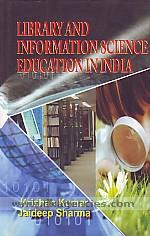 Library and Information Science Education in India, by Krishan Kumar and Jaideep Sharma. New Delhi, Har-Anand Publications Pvt. Ltd. 2009. ISBN: 8124114650; US$ 33.00; 312 p.
Library and Information Science Education in India, by Krishan Kumar and Jaideep Sharma. New Delhi, Har-Anand Publications Pvt. Ltd. 2009. ISBN: 8124114650; US$ 33.00; 312 p.“LIS Education is the most crucial input for the development of libraries. … The book has been primarily written to meet the needs of the researchers of Library and Information Science. It will also serve as a basic source for students of LIS for the course of LIS Education both at M. Phil and MLIS levels.” (cover)
Contents: Chapter: I. History; II Organizations and their role; III. Levels of courses; IV. Admission requirements; V. Course content; VI. Course Delivery : teaching methods tools and evaluation; VII. Infrastructure; VIII. Status and accreditation; IX. Distance education; X. Issues, developments trends and suggestionsProfessors Krishan Kumar and Jaideep Sharma have done an excellent job of cataloguing the main facets of LIS education in India. The authors have been directly involved in teaching, training and are personally exposed to the tools, techniques, methods and out-come of LIS programs in India. Both have a good grasp of what is imported and what is exported by LIS professionals and have a balanced approach about how much of thinking local and acting global is essential today—especially introduction of the book reflects this perspective of what works abroad and what works in India. For instance, the recent growth of I schools in California and Mysore will interest many LIS educationists to see the synchronization that is taking place (I-School movement, p. 57).
Library and Information Science Education in India is a handy source for researchers, post-graduates, as well as for an advanced study of LIS education in India as it evolves. This book is also useful for those interested in comparative education, comparative and international librarianship as well as historiography of library world. Library historians, in short, will find this book indispensable.
Full review will appear in Library Times International
On the same shelf:

 Available @ Amazon.com
Available @ Amazon.com



 More about (my new home) Google sites and the old home, READ
More about (my new home) Google sites and the old home, READ
No comments:
Post a Comment